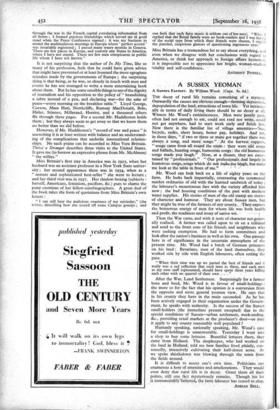- A SUSSEX YEOMAN
A Sussex Farmer. By William Wood. (Cape. 8s. 6d.)
THE decay of rural life remains something of a mystery. Outwardly the causes are obvious enough—farming depression, depopulation of the land, attractions of town life. Yet intrinsic- ally in terms of daily living there should be no decay at all.
Witness Mr. Wood's reminiscences. Men were poorly paid, often had not enough to eat, could not read nor write, could not get anywhere, had to start work early and finish late. Now there is the familiar list of village amenities—'bus, bicycle, radio, short hours, better pay, holidays. And yet, in those days, "if two or three or more got together there was always a song, and more songs." At the harvest suppers, "songs came from all round the room : they were old songs and ballads, hunting songs, humorous songs : the old humorous songs made you laugh." Now, at a dinner, they are enter- tained by "professionals." "Our professionals deal largely in humorous songs,.songs which .do not make me laiigh, but make me look at the table in front Of me."
Mr. Wood can look back on a life of eighty years on the farm. He looks back impartially, contrasting the ceremonial market ordinaries of old with the hurried sandwich of today ; the labourer's monotonous fare with the variety afforded him now ; the bad housing conditions of the past with modern water supplies. His stories of men of the old stamp are stories of character and humour. They are about Sussex men, but they might be true of the farmert of any county.. They. express the boisterous energy of men for whom life was both health and profit, the readiness and irony of native wit.
Then the War came, and with it tests of character not gener- ally realised. A farmer was called upon to sit on a tribnnal and send to the front sons of his friends and neighbours who were seeking exemption. He had to form committees and look after the nation's business as well as his own. One passage here is of significance in the uncertain atmosphere of the present time. Mr. Wood had a batch of German prisoners on his land : Bavarians, men of the land themselves, they worked side by side with English labourers, often setting the pace.
"When their time was up we parted the best of friends and it really was a sad reflection that such men as these' and such men as my own staff represented, should have spent three years killing each other with no quarrel of their own . . ."
After the War, Land Settlement. Surprisingly for a farmer born and bred, Mr. Wood is in favour of small-holdings ; the more so for the fact that his opinion is a conversion from the opposite and more general yeoman view. He says that in his county they have in the main succeeded. As he has been actively engaged in their organisation under the Govern-
ment, he speaks with authority. Is the success of the Sussex small-holders (the immediate present excepted) due to the special conditions of Sussex—urban settlement, week-ending, &c., providing retail markets at the producer's door—or may it apply to any county reasonably well populated ?
Humanly speaking, nationally speaking, Mr. Wood's case for small-holdings is unanswerable. Yesterday I went into a shop to buy some lettuces. Beautiful lettuces there, they Came from Holland. The shopkeeper, who had worked on the land in Holland, told me how families lived plainly, con- tentedly, intensively cultivating their half-dozen acres. As we spoke thistledown was blowing through the town from the fields around.
It is difficult to assess one's own time. Politicians . can enumerate a host of amenities and ameliorations. They would even deny that rural life is in decay. Grant them all their points, still one fact mysteriously remains. Though his lot is immeasurably`beitered, the farm labourer has ceased to sing.
ADRIAN BELL.










































 Previous page
Previous page